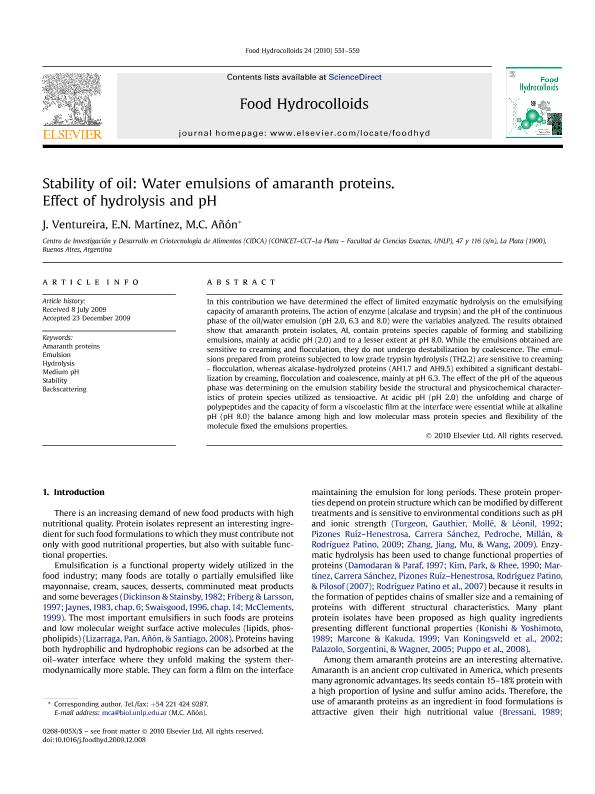Artículo
Stability of oil: Water emulsions of amaranth proteins: Effect of hydrolysis and pH
Fecha de publicación:
08/2010
Editorial:
Elsevier
Revista:
Food Hydrocolloids
ISSN:
0268-005X
e-ISSN:
1873-7137
Idioma:
Inglés
Tipo de recurso:
Artículo publicado
Clasificación temática:
Resumen
In this contribution we have determined the effect of limited enzymatic hydrolysis on the emulsifying capacity of amaranth proteins. The action of enzyme (alcalase and trypsin) and the pH of the continuous phase of the oil/water emulsion (pH 2.0, 6.3 and 8.0) were the variables analyzed. The results obtained show that amaranth protein isolates, AI, contain proteins species capable of forming and stabilizing emulsions, mainly at acidic pH (2.0) and to a lesser extent at pH 8.0. While the emulsions obtained are sensitive to creaming and flocculation, they do not undergo destabilization by coalescence. The emulsions prepared from proteins subjected to low grade trypsin hydrolysis (TH2.2) are sensitive to creaming - flocculation, whereas alcalase-hydrolyzed proteins (AH1.7 and AH9.5) exhibited a significant destabilization by creaming, flocculation and coalescence, mainly at pH 6.3. The effect of the pH of the aqueous phase was determining on the emulsion stability beside the structural and physicochemical characteristics of protein species utilized as tensioactive. At acidic pH (pH 2.0) the unfolding and charge of polypeptides and the capacity of form a viscoelastic film at the interface were essential while at alkaline pH (pH 8.0) the balance among high and low molecular mass protein species and flexibility of the molecule fixed the emulsions properties.
Palabras clave:
AMARANTH PROTEINS
,
BACKSCATTERING
,
EMULSION
,
HYDROLYSIS
,
MEDIUM PH
,
STABILITY
Archivos asociados
Licencia
Identificadores
Colecciones
Articulos(CIDCA)
Articulos de CENTRO DE INV EN CRIOTECNOLOGIA DE ALIMENTOS (I)
Articulos de CENTRO DE INV EN CRIOTECNOLOGIA DE ALIMENTOS (I)
Citación
Ventureira, Jorge Luis; Martinez, Estela Nora; Añon, Maria Cristina; Stability of oil: Water emulsions of amaranth proteins: Effect of hydrolysis and pH; Elsevier; Food Hydrocolloids; 24; 6-7; 8-2010; 551-559
Compartir
Altmétricas




